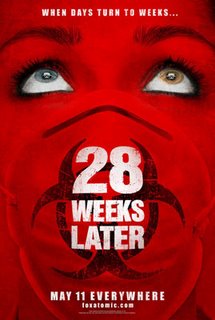
Watching
28 Weeks Later, I felt like I had just paid to have someone shake me uncontrollably and scream in my ear for 100 minutes. I felt physically drained by the time it was over, and not in a good way. This film, a sequel to the 2002 horror film
28 Days Later, is a total assault on the senses. It bombards you with images edited so rapidly they often become an incomprehensible blur, and the soundtrack has been jacked up to almost deafening levels for a constant attack on your ears. You can see a lot of promise up there on the screen, and there are some decent performances as well. But they are fighting a losing battle against director Juan Carlos Fresnadillo's decision to often make the movie as annoying as it possibly can be.
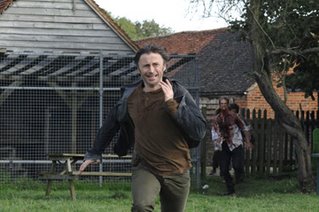
Just as the title suggests, the film is set a few months after the events of the original film, where a mysterious Rage virus turned people into soulless carnivorous zombies. England is now deserted, and the zombies have been starved off. The US military moves in to quarantine the area, and slowly begins to repopulate the area. A young boy named Andy (Mackintosh Muggleton) and teenage sister Tammy (Imogen Poots) return home after they were forced to flee the country, and are now ready to start new lives with their father (Robert Carlyle), who has managed to survive the zombie invasion. The kids obviously want to know what happened to their mother, and dad doesn't know how to tell them how he abandoned her when they were attacked, as we witness in the film's opening scene. While Andy and Tammy are exploring some of the "forbidden" areas of England that have not yet been completely quarantined, they discover that their mother (Catherine McCormick) is still alive. She somehow is immune to the Rage virus, so she does not show signs of infection, even though she carries the virus within her ever since she was attacked. The father, unfortunately, is not quite so immune, and as soon as he comes in physical contact with her, the virus is spread and a whole new group of zombies are immediately born. Andy and Tammy must team up with a small band of survivors and US soldiers to try to escape this new threat with their lives.
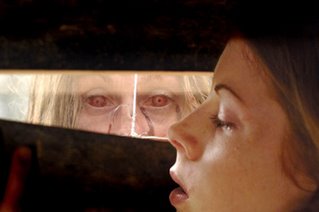
In concept,
28 Weeks Later sounds like a pretty smart follow up to the original film. I liked the idea of a society struggling to rebuild itself after a grand catastrophe, and wish that the movie would have gone deeper into this rebuilt world the few survivors find themselves in when they return home to England. Do they feel happy? Do they feel like it's just not the same anymore? Is it hard to come home after such a tragic occurrence? The premise brings forth some intriguing questions, many of which go unanswered. Instead, the movie seems to be trying to make a not-too subtle political statement about the US military. Most of the soldiers are portrayed as boorish, foul-mouthed louts who act as voyeurs and spy on people through the scopes of their rifles. They also make numerous decisions that lead to mass destruction or unintended chaos. These decisions are explained to us, but they more often seemed to exist to set up some pretty impressive set pieces, such as when most of the city is firebombed after the virus break out in the new society. The film is full of moments that look great, but hold very little emotional hold on us, because the movie charges full speed ahead in its plot, little caring about the people inhabiting it. When the children find out that their mother is alive, their confrontation with their father seems cut short and less dramatic than it should be. The one sequence that truly works the way the filmmakers intend is a creepy scene where the heroes must make their way through a dark underground subway tunnel, and most of the sequence is shot through the green scope of a character's gun. Unfortunately, this sequence comes late in the film, and by then, it's a little too late.
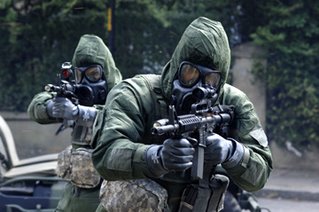
As technically well done as most of the film is,
28 Weeks Later seems to lose all control whenever the mood of the film turns the least bit chaotic or intense. The attack scenes are often a confusing and flat-out obnoxious mess of images, high-pitched screams, and rapid-fire cuts that make following the action all but impossible. There were moments when I thought a person was being killed, only for it to turn out a completely different person had been killed, and the one who I thought was dead was standing nearby, perfectly fine. The soundtrack is cranked up to almost thunderous levels during these moments, making them just as hard on the ears as they are on the eyes. The attack sequences use some other pointless tricks, such as briefly filming scenes with a red tint for reasons unknown. When the camera stops shaking around and slows down long enough to let us actually glimpse what is happening, there is some disturbing images that are sure to drive gorehounds wild. But, I often felt like I was only getting half the image. I could probably live with this if the film was less driven by action. After a fairy character-heavy middle portion, the film switches over to action, and never looks back. Characters who once seemed potentially interesting are now reduced to running through one well-done but ultimately mindless action sequence after another, and forced to say lines like "It's only a flesh wound". (If you can hear a British actor say that line, and not think of Monty Python, you're a stronger man than I.)
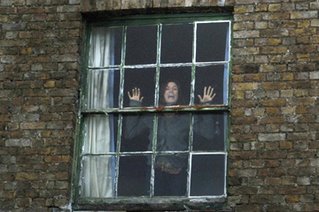
Even when the film's narrative falls apart due to some obnoxious editing techniques, the film is still technically sound all the way through. The abandoned London setting is appropriately creepy, but not used to its fullest other than the sequence where Andy and Tammy explore the forbidden area of London. I suppose it could be argued this idea was explored more in the original film, but they still could have used more of it. The performances all around are generally sound, though there is no one aspect that stands out above the rest. Robert Carlyle as the father of the two young leads comes off the best, as he is faced with a difficult situation in the film's opening scene that haunts him for the rest of the film. Too bad this angle is dropped halfway through when he becomes the carrier of the new Rage outbreak. I guess that could sum up my reaction to this film overall. There are a lot of great ideas and images up there on the screen that either are underdeveloped, or fail to live up to their potential. Characters are never developed past a certain major goal, and many seem to act simply because there wouldn't be a movie if they didn't carry out the action. After last week's
Spider-Man 3 and now this, I'd really like to see an action-based film where characters' actions are not based around simply playing by the rules of the plot.
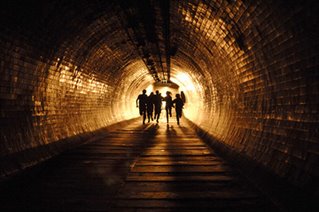
I remember the original
28 Days Later getting a lot of praise, but I wasn't a huge fan. The sequel has done very little to change my mind.
28 Weeks Later seems like they took a workable idea, and then didn't bother to do much with it. It's not a terrible film by any means, but it never quite builds to what it should be. When it was over, I felt exhausted, but not really entertained. The film's ending seems to set up an inevitable sequel. While I don't exactly welcome the idea with open arms, I do see how this premise can be fixed if the editing allowed us to actually see what was happening more often and if the characters were more memorable. Until someone gets it right, all I see is a lot of talent put to a lot of wasted potential and half-baked ideas.
0 comments
 Watching 28 Weeks Later, I felt like I had just paid to have someone shake me uncontrollably and scream in my ear for 100 minutes. I felt physically drained by the time it was over, and not in a good way. This film, a sequel to the 2002 horror film 28 Days Later, is a total assault on the senses. It bombards you with images edited so rapidly they often become an incomprehensible blur, and the soundtrack has been jacked up to almost deafening levels for a constant attack on your ears. You can see a lot of promise up there on the screen, and there are some decent performances as well. But they are fighting a losing battle against director Juan Carlos Fresnadillo's decision to often make the movie as annoying as it possibly can be.
Watching 28 Weeks Later, I felt like I had just paid to have someone shake me uncontrollably and scream in my ear for 100 minutes. I felt physically drained by the time it was over, and not in a good way. This film, a sequel to the 2002 horror film 28 Days Later, is a total assault on the senses. It bombards you with images edited so rapidly they often become an incomprehensible blur, and the soundtrack has been jacked up to almost deafening levels for a constant attack on your ears. You can see a lot of promise up there on the screen, and there are some decent performances as well. But they are fighting a losing battle against director Juan Carlos Fresnadillo's decision to often make the movie as annoying as it possibly can be. Just as the title suggests, the film is set a few months after the events of the original film, where a mysterious Rage virus turned people into soulless carnivorous zombies. England is now deserted, and the zombies have been starved off. The US military moves in to quarantine the area, and slowly begins to repopulate the area. A young boy named Andy (Mackintosh Muggleton) and teenage sister Tammy (Imogen Poots) return home after they were forced to flee the country, and are now ready to start new lives with their father (Robert Carlyle), who has managed to survive the zombie invasion. The kids obviously want to know what happened to their mother, and dad doesn't know how to tell them how he abandoned her when they were attacked, as we witness in the film's opening scene. While Andy and Tammy are exploring some of the "forbidden" areas of England that have not yet been completely quarantined, they discover that their mother (Catherine McCormick) is still alive. She somehow is immune to the Rage virus, so she does not show signs of infection, even though she carries the virus within her ever since she was attacked. The father, unfortunately, is not quite so immune, and as soon as he comes in physical contact with her, the virus is spread and a whole new group of zombies are immediately born. Andy and Tammy must team up with a small band of survivors and US soldiers to try to escape this new threat with their lives.
Just as the title suggests, the film is set a few months after the events of the original film, where a mysterious Rage virus turned people into soulless carnivorous zombies. England is now deserted, and the zombies have been starved off. The US military moves in to quarantine the area, and slowly begins to repopulate the area. A young boy named Andy (Mackintosh Muggleton) and teenage sister Tammy (Imogen Poots) return home after they were forced to flee the country, and are now ready to start new lives with their father (Robert Carlyle), who has managed to survive the zombie invasion. The kids obviously want to know what happened to their mother, and dad doesn't know how to tell them how he abandoned her when they were attacked, as we witness in the film's opening scene. While Andy and Tammy are exploring some of the "forbidden" areas of England that have not yet been completely quarantined, they discover that their mother (Catherine McCormick) is still alive. She somehow is immune to the Rage virus, so she does not show signs of infection, even though she carries the virus within her ever since she was attacked. The father, unfortunately, is not quite so immune, and as soon as he comes in physical contact with her, the virus is spread and a whole new group of zombies are immediately born. Andy and Tammy must team up with a small band of survivors and US soldiers to try to escape this new threat with their lives. In concept, 28 Weeks Later sounds like a pretty smart follow up to the original film. I liked the idea of a society struggling to rebuild itself after a grand catastrophe, and wish that the movie would have gone deeper into this rebuilt world the few survivors find themselves in when they return home to England. Do they feel happy? Do they feel like it's just not the same anymore? Is it hard to come home after such a tragic occurrence? The premise brings forth some intriguing questions, many of which go unanswered. Instead, the movie seems to be trying to make a not-too subtle political statement about the US military. Most of the soldiers are portrayed as boorish, foul-mouthed louts who act as voyeurs and spy on people through the scopes of their rifles. They also make numerous decisions that lead to mass destruction or unintended chaos. These decisions are explained to us, but they more often seemed to exist to set up some pretty impressive set pieces, such as when most of the city is firebombed after the virus break out in the new society. The film is full of moments that look great, but hold very little emotional hold on us, because the movie charges full speed ahead in its plot, little caring about the people inhabiting it. When the children find out that their mother is alive, their confrontation with their father seems cut short and less dramatic than it should be. The one sequence that truly works the way the filmmakers intend is a creepy scene where the heroes must make their way through a dark underground subway tunnel, and most of the sequence is shot through the green scope of a character's gun. Unfortunately, this sequence comes late in the film, and by then, it's a little too late.
In concept, 28 Weeks Later sounds like a pretty smart follow up to the original film. I liked the idea of a society struggling to rebuild itself after a grand catastrophe, and wish that the movie would have gone deeper into this rebuilt world the few survivors find themselves in when they return home to England. Do they feel happy? Do they feel like it's just not the same anymore? Is it hard to come home after such a tragic occurrence? The premise brings forth some intriguing questions, many of which go unanswered. Instead, the movie seems to be trying to make a not-too subtle political statement about the US military. Most of the soldiers are portrayed as boorish, foul-mouthed louts who act as voyeurs and spy on people through the scopes of their rifles. They also make numerous decisions that lead to mass destruction or unintended chaos. These decisions are explained to us, but they more often seemed to exist to set up some pretty impressive set pieces, such as when most of the city is firebombed after the virus break out in the new society. The film is full of moments that look great, but hold very little emotional hold on us, because the movie charges full speed ahead in its plot, little caring about the people inhabiting it. When the children find out that their mother is alive, their confrontation with their father seems cut short and less dramatic than it should be. The one sequence that truly works the way the filmmakers intend is a creepy scene where the heroes must make their way through a dark underground subway tunnel, and most of the sequence is shot through the green scope of a character's gun. Unfortunately, this sequence comes late in the film, and by then, it's a little too late. As technically well done as most of the film is, 28 Weeks Later seems to lose all control whenever the mood of the film turns the least bit chaotic or intense. The attack scenes are often a confusing and flat-out obnoxious mess of images, high-pitched screams, and rapid-fire cuts that make following the action all but impossible. There were moments when I thought a person was being killed, only for it to turn out a completely different person had been killed, and the one who I thought was dead was standing nearby, perfectly fine. The soundtrack is cranked up to almost thunderous levels during these moments, making them just as hard on the ears as they are on the eyes. The attack sequences use some other pointless tricks, such as briefly filming scenes with a red tint for reasons unknown. When the camera stops shaking around and slows down long enough to let us actually glimpse what is happening, there is some disturbing images that are sure to drive gorehounds wild. But, I often felt like I was only getting half the image. I could probably live with this if the film was less driven by action. After a fairy character-heavy middle portion, the film switches over to action, and never looks back. Characters who once seemed potentially interesting are now reduced to running through one well-done but ultimately mindless action sequence after another, and forced to say lines like "It's only a flesh wound". (If you can hear a British actor say that line, and not think of Monty Python, you're a stronger man than I.)
As technically well done as most of the film is, 28 Weeks Later seems to lose all control whenever the mood of the film turns the least bit chaotic or intense. The attack scenes are often a confusing and flat-out obnoxious mess of images, high-pitched screams, and rapid-fire cuts that make following the action all but impossible. There were moments when I thought a person was being killed, only for it to turn out a completely different person had been killed, and the one who I thought was dead was standing nearby, perfectly fine. The soundtrack is cranked up to almost thunderous levels during these moments, making them just as hard on the ears as they are on the eyes. The attack sequences use some other pointless tricks, such as briefly filming scenes with a red tint for reasons unknown. When the camera stops shaking around and slows down long enough to let us actually glimpse what is happening, there is some disturbing images that are sure to drive gorehounds wild. But, I often felt like I was only getting half the image. I could probably live with this if the film was less driven by action. After a fairy character-heavy middle portion, the film switches over to action, and never looks back. Characters who once seemed potentially interesting are now reduced to running through one well-done but ultimately mindless action sequence after another, and forced to say lines like "It's only a flesh wound". (If you can hear a British actor say that line, and not think of Monty Python, you're a stronger man than I.) Even when the film's narrative falls apart due to some obnoxious editing techniques, the film is still technically sound all the way through. The abandoned London setting is appropriately creepy, but not used to its fullest other than the sequence where Andy and Tammy explore the forbidden area of London. I suppose it could be argued this idea was explored more in the original film, but they still could have used more of it. The performances all around are generally sound, though there is no one aspect that stands out above the rest. Robert Carlyle as the father of the two young leads comes off the best, as he is faced with a difficult situation in the film's opening scene that haunts him for the rest of the film. Too bad this angle is dropped halfway through when he becomes the carrier of the new Rage outbreak. I guess that could sum up my reaction to this film overall. There are a lot of great ideas and images up there on the screen that either are underdeveloped, or fail to live up to their potential. Characters are never developed past a certain major goal, and many seem to act simply because there wouldn't be a movie if they didn't carry out the action. After last week's Spider-Man 3 and now this, I'd really like to see an action-based film where characters' actions are not based around simply playing by the rules of the plot.
Even when the film's narrative falls apart due to some obnoxious editing techniques, the film is still technically sound all the way through. The abandoned London setting is appropriately creepy, but not used to its fullest other than the sequence where Andy and Tammy explore the forbidden area of London. I suppose it could be argued this idea was explored more in the original film, but they still could have used more of it. The performances all around are generally sound, though there is no one aspect that stands out above the rest. Robert Carlyle as the father of the two young leads comes off the best, as he is faced with a difficult situation in the film's opening scene that haunts him for the rest of the film. Too bad this angle is dropped halfway through when he becomes the carrier of the new Rage outbreak. I guess that could sum up my reaction to this film overall. There are a lot of great ideas and images up there on the screen that either are underdeveloped, or fail to live up to their potential. Characters are never developed past a certain major goal, and many seem to act simply because there wouldn't be a movie if they didn't carry out the action. After last week's Spider-Man 3 and now this, I'd really like to see an action-based film where characters' actions are not based around simply playing by the rules of the plot. I remember the original 28 Days Later getting a lot of praise, but I wasn't a huge fan. The sequel has done very little to change my mind. 28 Weeks Later seems like they took a workable idea, and then didn't bother to do much with it. It's not a terrible film by any means, but it never quite builds to what it should be. When it was over, I felt exhausted, but not really entertained. The film's ending seems to set up an inevitable sequel. While I don't exactly welcome the idea with open arms, I do see how this premise can be fixed if the editing allowed us to actually see what was happening more often and if the characters were more memorable. Until someone gets it right, all I see is a lot of talent put to a lot of wasted potential and half-baked ideas.
I remember the original 28 Days Later getting a lot of praise, but I wasn't a huge fan. The sequel has done very little to change my mind. 28 Weeks Later seems like they took a workable idea, and then didn't bother to do much with it. It's not a terrible film by any means, but it never quite builds to what it should be. When it was over, I felt exhausted, but not really entertained. The film's ending seems to set up an inevitable sequel. While I don't exactly welcome the idea with open arms, I do see how this premise can be fixed if the editing allowed us to actually see what was happening more often and if the characters were more memorable. Until someone gets it right, all I see is a lot of talent put to a lot of wasted potential and half-baked ideas.






0 Comments:
Post a Comment
<< Home